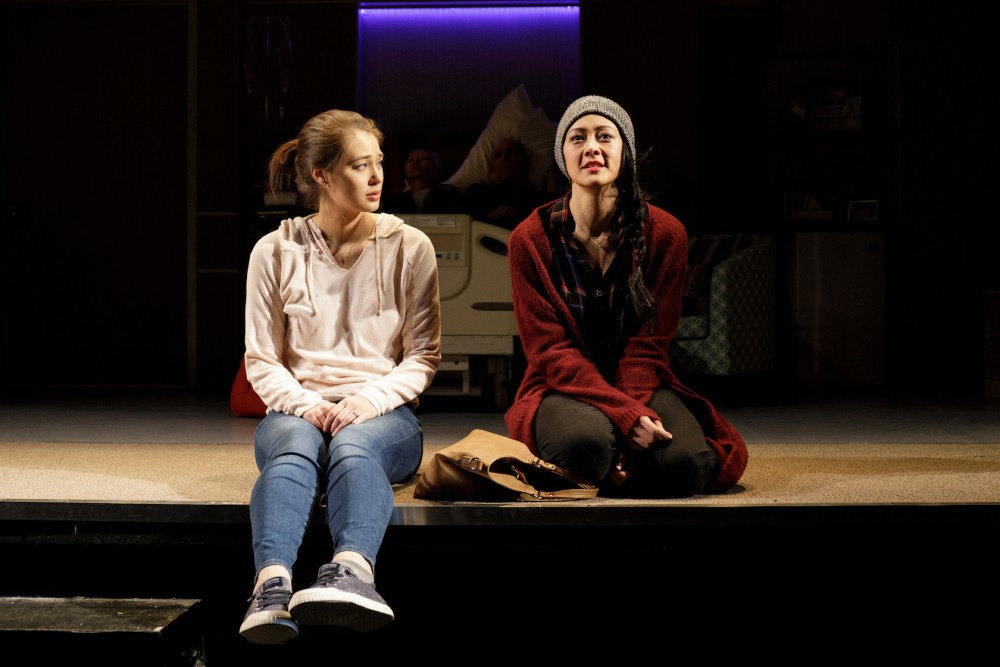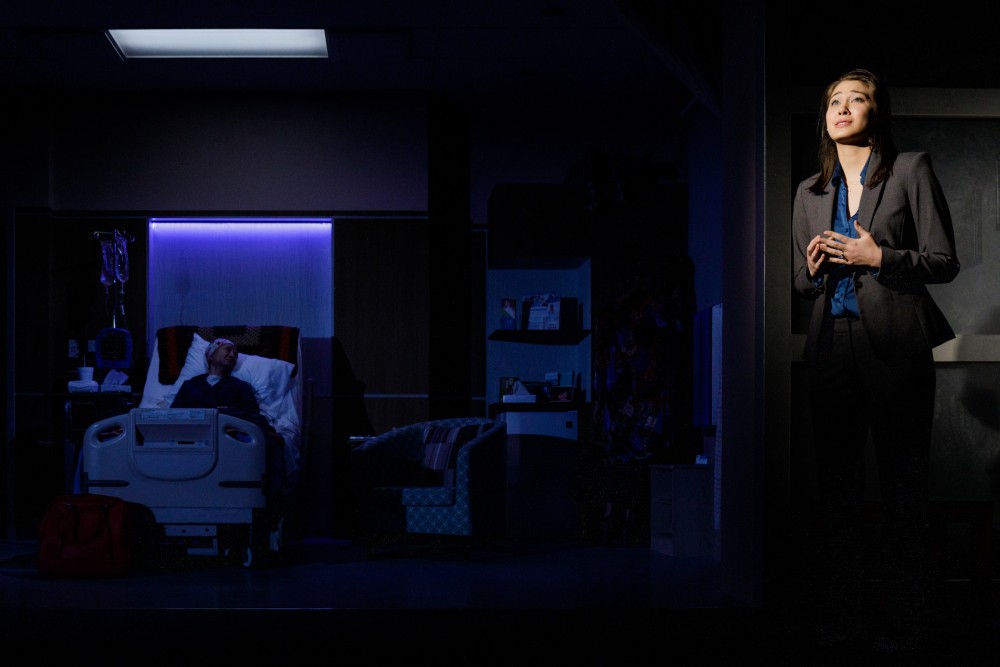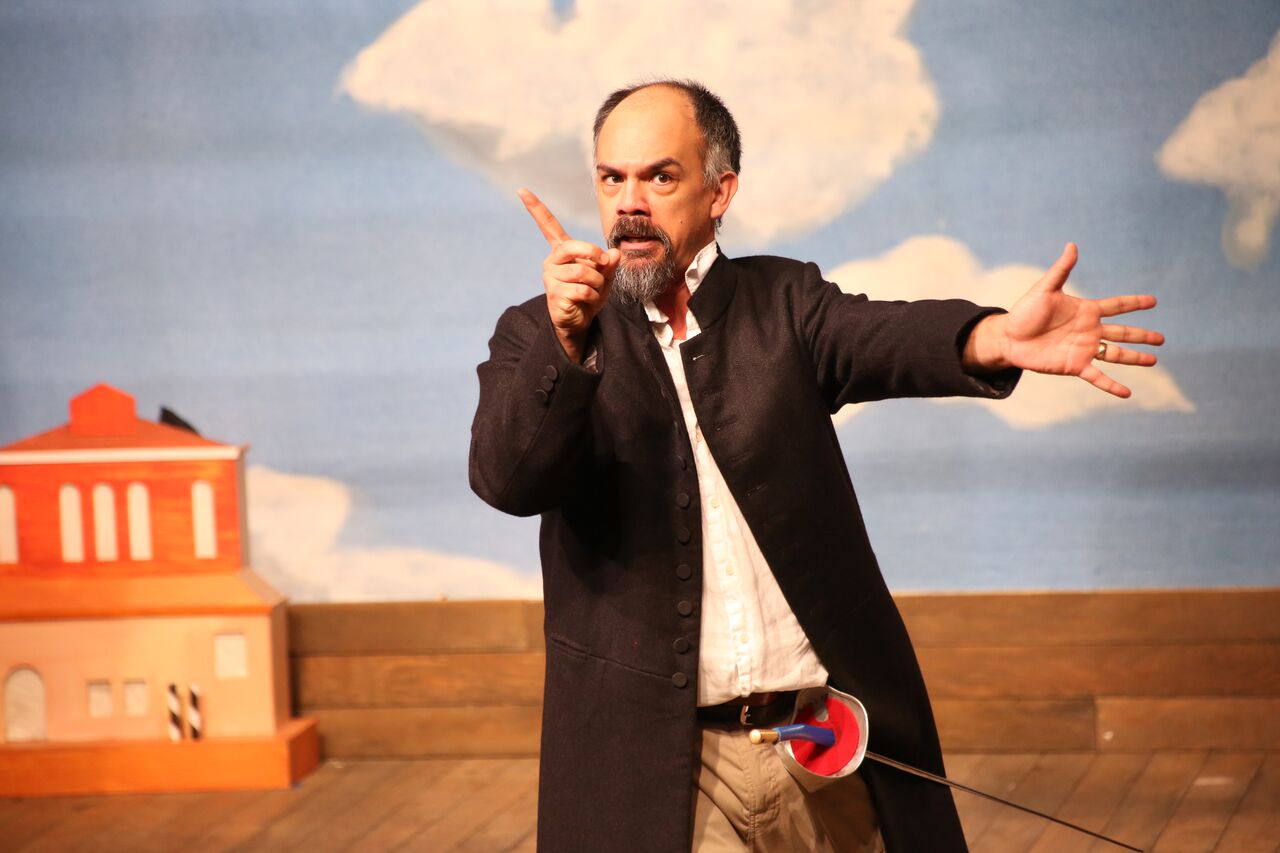
Satomi Blair, Emma Kikue, Ako, and Jay Patterson
by Hazen Cuyler
To document your mother’s suffering as she dies from cancer requires courage. To expose a family’s feelings and desires throughout that traumatic time might be even more burdensome. Right now, Primary Stages has produced God Said This by Leah Nanako Winkler. Written by Leah Nanako Winkler and directed by Morgan Gould, The Primary Stages production of God Said This runs through February 15. Based on Winkler’s experiences, the play sizzles with clever dialogue and well documented behavior. But without suspense or clear character motivations, God Said This struggles to engage.
Masako is a mother and wife. And she has cancer. She’s hospitalized and undergoing chemotherapy with the support and visitation of her family. Her husband James is a recovering alcoholic. Hiro and Sophie are their two daughters. Sophie is religious and married, Hiro is not. Hiro and her father have a painful relationship. Near the start we meet John (Tom Coiner), a responsible former classmate of Hiro’s who has a charmingly capricious temperament. Together, he and Hiro smoke pot and confide in each other. The play cycles through these relationships.


Emma Kikue and Satomi Blair
A fascinating characterization of the alcoholic father is embodied by Jay Patterson. A kind spirit shackled to a hopelessly addictive personality. If it’s not alcohol, it’s a rock collection. He’s mostly bald and his gut protrudes and his feet sprawl out as he walks and his body is dried out from years of boozing. His clothes are disheveled and he knows how to talk; like habits grown from his friendly drinking years. And then James recalls first meeting his wife. Mr. Patterson descends into the audience to meet her memory. His eyes glow from a profound, grateful love surpassing all barriers of time and space. From up close we experience the feeling of companionship from a gifted actor.
Through the commanding Ako (credited as her full name) we experience Masako’s dynamic and exhausting stages of her devastating journey. Drugged-up optimism. Shameful helplessness. And Masako’s anger and hatred and violence; desperate to escape her failing body’s prison.
Despite these powerful performances, we rarely experience lasting conflict or suspense. We experience notable flare-ups of confrontation, but they dissipate as quickly as they arrive. The overuse of low stakes expositional dialogue also help to stave off tension for large portions of the play.
Here’s an example of a flare-up which does little to continue the momentum of the play:
Hiro (Satomi Blair) misses her period and tells her family-oriented sister, Sophie (Emma Kikue). Sophie reveals to Hiro that she can’t have children. This escalated conversation acts to further articulate a bitter conflict between the two sisters’ conflicting lifestyles. But it’s never been noticeably alluded to previously in the play. And then it’s never brought up again. Outside of added information, the conflict doesn’t contribute to the subsequent events, plot or forward momentum of the piece.


Ako, Emma Kikue
Although examples are littered throughout the play, the following scene demonstrates the most obvious use of low stakes exposition, which helps dilute suspense throughout the production:
God Said This opens with a monologue from James. He stands on stage to speak to us, his AA group. We are his receptive, open, accepting group of people. Like a therapy session, this structure, repeated throughout the play, removes James from conflict and allows him to safely tell the audience what they should know about his background and the background of his family. It nullifies immediate conflict and we find ourselves forced into listening opposed to feeling compelled to listen.
The play’s observations are painful to experience, but you can’t help wonder what God Said This is actually trying to say. Yes, cancer is terrible and it happens to sweet people. And families are tormented and traumatized by the experience. But that experience is so common and so traumatic that many people are already able to articulate those haunting observations themselves. At the play’s conclusion, some stood in applause. I have a feeling their response has more to do with never having witnessed cancer’s effect on the human body and spirit, moments which the play carefully observes, or a projection of their personal experience caring for someone with cancer, as opposed to something newly revealed.
God Said This is a noble and brave undertaking directly from Ms. Winkler’s life. And her sharp observations brought audience members to tears. However, a play expressing the feeling of her unique experience is as important as it is challenging. Revealing physical observations is one thing. Revealing family relationships and hidden motivations during the most monumental crisis of their lives would be a remarkable achievement. And God Said This doesn’t quite reach those heights. Primary Stages supported a talented and accomplished writer fighting to say something about the most challenging period of her life. And if what she has to say is important to her, that journey might not be over yet.
God Said This. Through February 15 at the Cherry Lane Theatre (38 Commerce Street, Greenwich Village). Running Time: 1 hour 45 minutes. No Intermission. www.primarystages.org
Photos: James Leynse






















